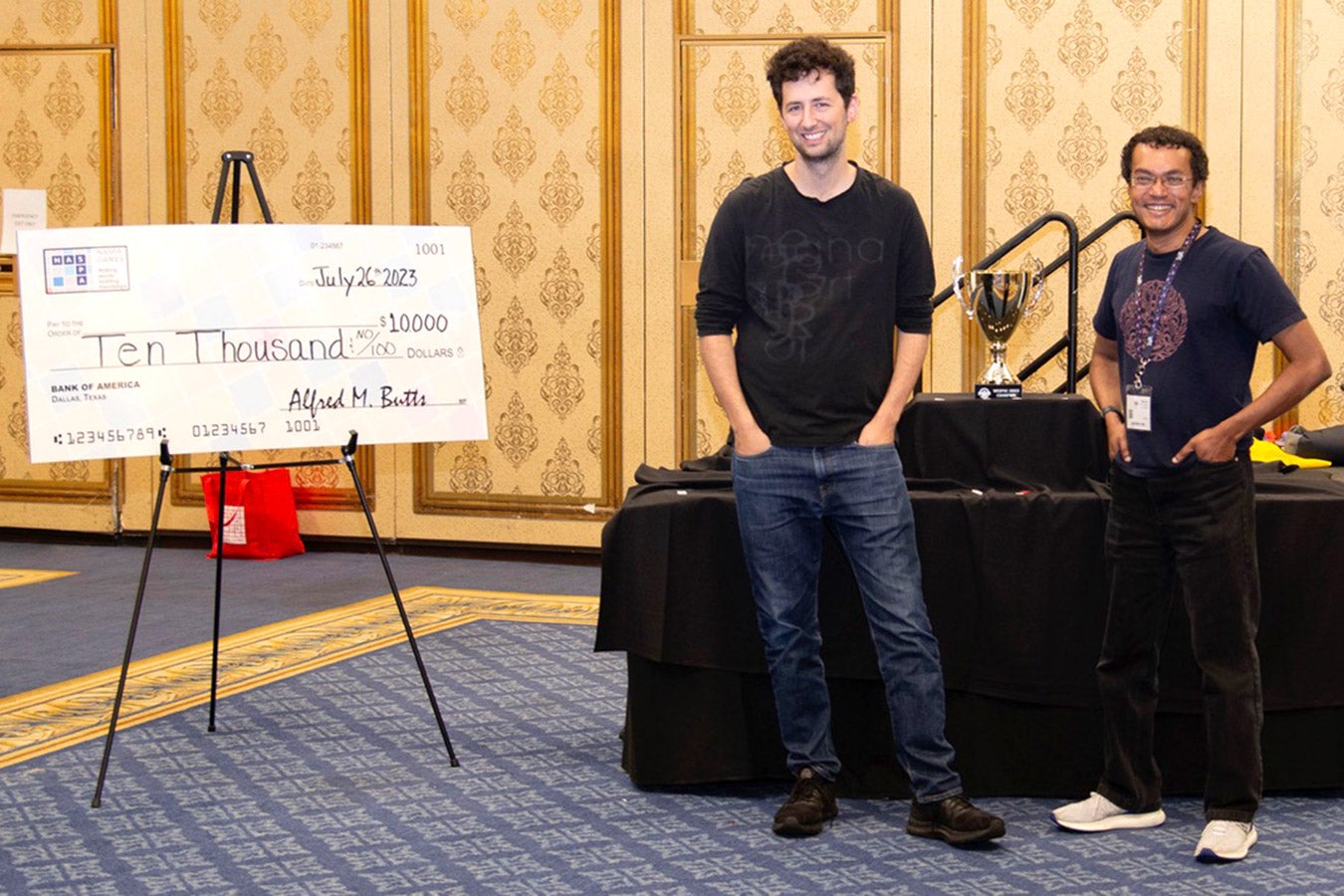The 2023 World Scrabble Championship, held last month in Las Vegas, was an instant classic. The best-of-seven finals went the distance, with tense games, obscure words, strategic genius, and a Scrabble-record audience of 900 watching on Twitch.
The winner was David Eldar, 33, of Melbourne, Australia, who defeated Harshan Lamabadusuriya, 44, a pediatrician who lives in Southmoor, England, to capture the $10,000 first prize. To reach the finals, they topped a field of 134 players from 29 countries—from Poland to Pakistan, Singapore to Sierra Leone—in a four-day, 32-game tournament. Lamabadusuriya posted a 23–9 record; Eldar was 22–9–1.
Game 6 of the finals was hailed by Scrabble experts as one of most exciting high-stakes games ever. I discussed it online with the two competitors. Our conversation has been edited and condensed for clarity.
Note: The event used the international-English Scrabble dictionary, which includes substantially more words than the lexicon governing competitive play in North America. To avoid confusion, words acceptable only in the international word list are marked with a #.
Stefan Fatsis: David, you trail three games to two and are up first in Game 6. You pull one of the two blank tiles and quickly play PRoTEGE (the lowercase letter denotes the blank) for 74 points. Did you realize it was the only acceptable bingo—that is, a word using all seven tiles and earning a 50-point bonus?
David Eldar: I did not realize that PRoTEGE was the only bingo in that rack. But to look any further once you find the highest-scoring bingo on the opening turn is usually a waste of time, and time matters.
Fatsis: Each player gets a total of 25 minutes to complete the game before incurring a penalty. Harshan, you draw AEIPSTX—Scrabble players usually alphabetize their tiles, on the rack and in written annotation—and bingo right back. You had two options in the same spot for 84 points: EPITAXES# (the plural of EPITAXIS#, a growth on the surface of a crystal) and EXPIATES (atones for). How did you decide which to play?
Harshan Lamabadusuriya: Steve Peters’ book The Chimp Paradox describes three modes of thinking: a calm, curious, analytical Human; a fast, automatic Computer; and a fearful, anxious, impulsive Chimp. The ideal outcome in Scrabble or any competitive endeavor is for the Human to make decisions with the aid of a well-trained Computer, keeping the Chimp boxed as much as possible. On that first turn, my Computer found EPITAXES as soon as David put the P on the board. My Chimp prevented a methodical search for a better alternative. EPITAXES and EXPIATES are roughly equivalent, but EXPIATES is more defensive, with a lower risk of a high-scoring response.
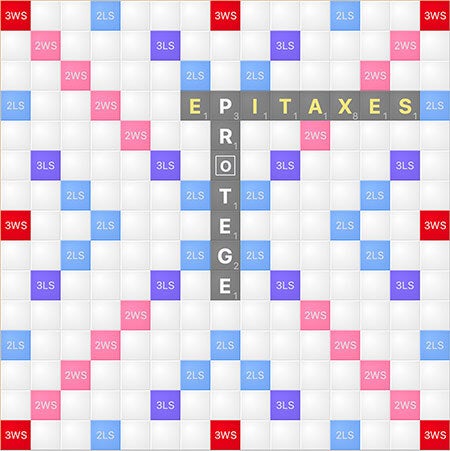
Fatsis: Right, the alternating vowels and consonants of EPITAXES with a double-word-score square atop them create a juicy spot for a parallel play. But, David, your next rack is dreck: two I’s, three O’s, a U, and an R. You use your turn to exchange five vowels, keeping an I and the R. Were you concerned not only that your opening salvo was neutralized, but that Harshan might hit back hard?
Eldar: According to the Scrabble analysis bot Quackle, on a wide-open board like this you’d average 47 points a turn. My tiles are so bad that I have no choice but to score zero points, and none of my letters are good enough to ensure that my next turn will be great, either. Harshan’s previous turn of 84 points is also way above average. I’m in deep shit and hating life here. Don’t forget, after this game I need to win another game. My odds of winning this tournament have now plummeted below 20 percent.
Fatsis: Scrabble players tend to loathe the letter I. Why did you keep one?
Eldar: Back in the day, before the dictionary expanded, or if you play the smaller North American word list, the I was not a particularly good letter. New calculations indicate that the I is actually a good letter and vowels are quite positive. Also, on an emotional level, a lot of players struggle with drawing duplicate I’s. Duplicate I’s suck. But even worse than duplicate I’s is a rack full of consonants. The new letter valuations suggest conso-loading must be avoided at all costs. Hence keeping a vowel with the R.
Ultimately, though, like PRoTEGE, it doesn’t matter whether you keep R, IR, or nothing here. You just need to play fast. Time matters more than a point here or there.
Fatsis: Harshan, you capitalize on the hot spot above EPITAXES with LAZED for a hefty 65 points, making LA, AX, the gender-neutral pronoun ZE#, and ES. Did you think about sliding the word two squares to the left for two fewer points, to set up the dreaded letter Q, which you’ve retained? You potentially had the U-less Q-word QAT, an East African shrub, for 32 points there on your next turn.
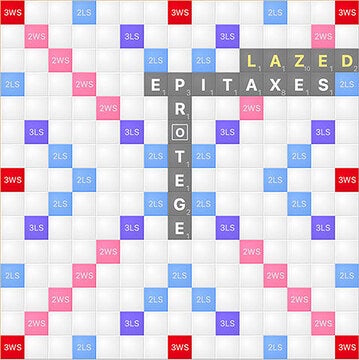
Lamabadusuriya: I did consider both positionings. I decided against the QAT spot because re-parallel plays below involving ZA-something and EXO# (Australian slang for excellent) would be potentially devastating. LAZED to the right scores two more points and still leaves a lower-scoring spot for the Q, QI (a life force) for 21 points.
Fatsis: David, your exchange works perfectly: You pull EFNST to join IR. Now you have a bunch of bingo options. SNIFTER plays in three places, one ending above the first E in EPITAXES, forming RE, for 75 points, and the other two under PRoTEGE, making PRoTEGES or PRoTEGEE, each for 80 points. What’s your thought process?
Eldar: “Uhhh, is PROTEGEE good? Yeah, of course it’s good, play it. No, it’s not, don’t play a phony [the Scrabble term for an invalid word], you idiot, just play the word you’re 100 percent sure of—PRoTEGES/SNIFTER is the same thing. Wait, of course PROTEGEE is valid, isn’t it a common word? Surely you’d know if it’s phony—you were right about PAVILION in Game 2, you must be right about this. OK, fuck it, if it’s phony you’ll just lose, stop wasting time. Whatever, here goes nothing. Whew, accepted. Did I just burn 30 seconds on this?”
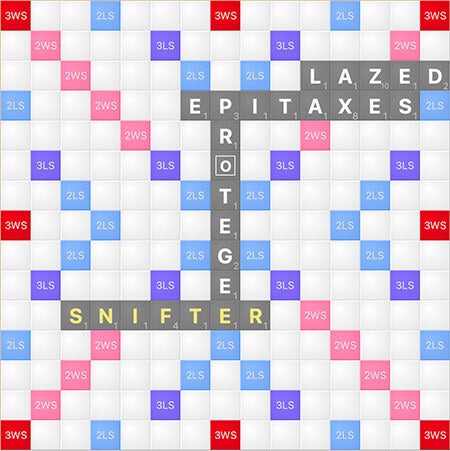
Fatsis: Lol, glad to know the best players sometimes think like us mortals. After just two plays apiece, the score is 154–149, David. On the Twitch livestream, commentator Matt Canik says, “This is gonna be a spicy one.” When I’m playing in a tournament, my adrenaline spikes at the prospect of a wide-open, high-scoring slugfest—but I’m also a little bummed that my good fortune is being matched by my opponent’s. David, you need this game to stay alive. Harshan, you’re one win from the title. What’s going through your minds?
Eldar: “He’s gonna score 50 now and my rack sucks. I’m dead.”
Lamabadusuriya: The ideal mindset at this stage is, “How can I solve this turn’s puzzle correctly?” Focusing on the potential outcome of the game or the tournament can be psychologically destructive and lead to errors.
Fatsis: Harshan, you now hold EKMNOS and the Q. OMEN for 46 points or OMENS for 51 under LAZED and EPITAXES—simultaneously forming TO, LAM, AXE, ZEN, and, potentially, ESS—are available. Instead, you drop the Q for 21. That’s a ton of points to pass up.
Lamabadusuriya: I loved the possibility of getting rid of the Q and scoring well next turn, with a fair chance of playing OMEN or OMENS. A leave of KQ or KQS presented definitively poorer scoring potential.
Fatsis: David, what did Harshan’s Q-dump signal to you?
Eldar: Harshan scored 21 points. The Q has a mathematical value in Scrabble of negative 7 points. So let’s say he scored a total of 28—21 for the play plus seven for shedding the Q. The average move score in this position is around 45. That’s a 17-point difference. I know he’s sitting on something half-decent.
Fatsis: Your rack is IJLNOPS. Quackle favors JO (a sweetheart) for 27 points beside the S in SNIFTER. You play JINNS, a supernatural being in Muslim mythology (other spellings: JIN, DJIN, DJINN, DJINNI, DJINNY, JINNI, JINNEE, and, yes, GENIE; English is complicated). JINNS scores 40 points but burns the third of the game’s four S’s.
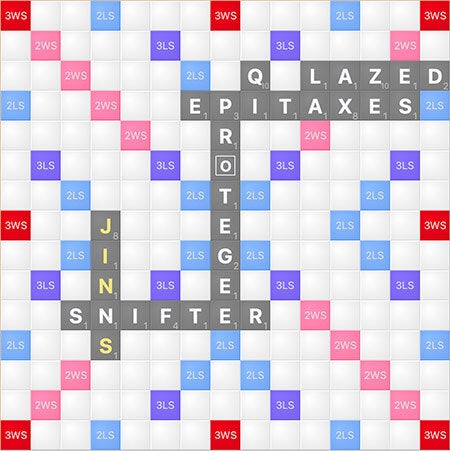
Eldar: I know that Harshan has good letters, and JINNS blocks some floaters—letters in open space through which a player can bingo. Playing defensively seemed like a good idea. But I was wrong. Computer simulation shows that JINNS barely reduces Harshan’s bingo percentage at all. This board is still too open. And after JO, I would have kept ILNPS, which work quite well together. On a wide-open board, they’re even better. I knew this intuitively, but in a finals it’s scary to play open. This shows how primitive my understanding of the game is here. I don’t really need to block, and I don’t block much anyway with JINNS. Big mistake.
Fatsis: Pivotal turn for you, Harshan. From a rack of EKMNOSU, you indeed play OMEN for 46 and a 216–194 lead. But you miss a bingo: MUSKONE#, which is defined as a macrocyclic ketone. You took some grief in the livestream chat, but it’s not easy to play under pressure and on camera. What happened?
Lamabadusuriya: I had a Spidey-sense there was a playable bingo on this rack. Unfortunately, I wasted time agonizing over whether GUNSMOKE is a valid word. I correctly concluded that I more likely knew it from leisure reading or the old American TV show. I very briefly considered whether UNSMOKE is good—it isn’t—before moving on to OMEN.
For the record, I checked my history in the word-study program Zyzzyva and found I had correctly solved MUSKONE 14 times in a row and had last seen it 170 days ago. But finding a solution on a flashcard where you know there’s a correct answer is much easier than finding one over the board.
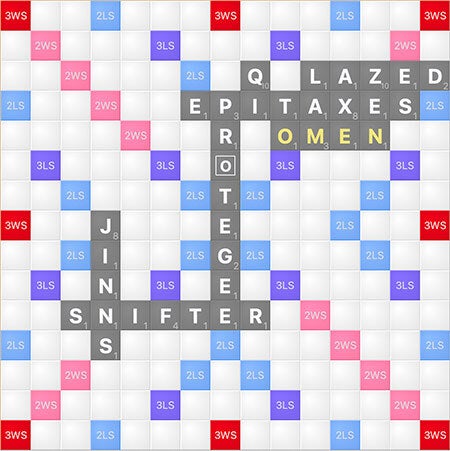
Fatsis: David, earlier in the tournament you missed a couple of gettable bingos: COZENER (a cheater) for a whopping 135 points and DOGGIEST (most resembling a dog). You also flubbed an endgame, failing to spot TROUTER# (a trout fisherman) through OU# (South African, a man or bloke). You guys weren’t alone. A few days earlier, in the North American championship finals, the winner, 29-year-old Josh Sokol of Montreal, missed LOPPIEST, which means limpest.
I’ve been playing and writing about Scrabble for more than 25 years. I and other lower-rated experts make these sorts of blunders all the time. When the best players, who have studied exponentially more words than we have, screw up, it’s a reminder that the game is played by humans with imperfect brains that occasionally glitch out. So thanks for that, I guess.
Eldar: I can’t explain the COZENER miss. Empirical evidence suggests I was just tired. In the first seven days in Vegas, I missed zero bingos and didn’t lose any turns playing phonies. [Ed. note: Eldar also played in the international-lexicon division of the North American championship a few days before, finishing second to 2015 world champ Wellington Jighere of Nigeria.] In the last three days, I missed about five bingos and lost one turn playing a phony. I couldn’t place DOGGIER/DOGGIEST anywhere in my head. The TROUTER miss is one of the stupidest losses I ever recall. I think I was so upset by a moronic play two or three turns earlier that I decided that I deserved to lose this game and mentally checked out.
Scrabble is really hard to master and your results directly reflect how much time you put into it. Yes, I’ve put in zillions of hours studying words and strategy. But to play without ever missing a bingo or playing a phony or missing an outplay would require eight hours a day of study for years, and while we high-level experts care a lot, none of us care that much. That’s why we make those errors—we’d rather be doing other things with our spare time. Harshan would probably rather be hanging out with his wife and son than anagramming MUSKONE for the 30th time.
Fatsis: David, you keep stacking letters in that upper-right quadrant, playing PAD and forming TOP, LAMA, and AXED, for 41 points. I sometimes spot and forget possible overlaps and underlaps. How do you ensure that, in the chaos of possibilities and information on the developing board, you don’t overlook them?
Eldar: Low experts are scared of S-hooks and bingo lanes. Top experts are scared of massive overlaps and underlaps using several multiplier squares. Spend enough time analyzing games and you’ll know where the danger is for you and your opponent.
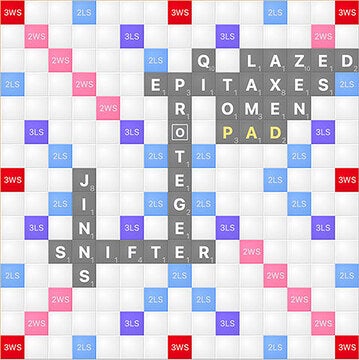
Fatsis: Harshan, your rack heads south: EKRSUWY. When a U and W arrive together, it’s like the cops showing up at a party: not good. In fact, UW is mathematically tied (with UV) for the worst vowel-consonant combination in Scrabble. Add the Y and things get even uglier. Quackle wants you to play WUD (Scottish, to load with wood) in the northeast corner to address the problem. You do not. How come?
Lamabadusuriya: My Chimp wanted me to block bingos hooking onto the first E of EPITAXES on a board that was otherwise unfriendly to seven-letter plays. A straightforward play of WUD would have kept a lovely scoring leave for that same spot. I was guilty of loss aversion—sacrificing equity to minimize the pain of a potential opponent bingo. Like David with JINNS, I blocked when I didn’t need to.
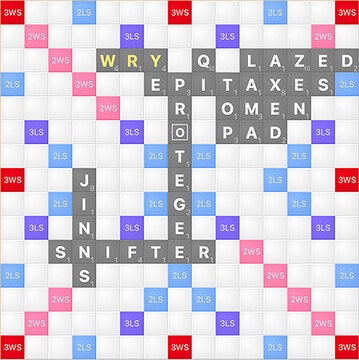
Fatsis: On his next turn, Harshan plays HUNK on the left side, allowing “front-hooks” of C and T, for CHUNK and THUNK, heading down to a triple-word-score square. Then he gets a gift from the tile gods: the common letters AEINST plus a second A. ENTASIA (a spasmodic contraction of a muscle) scores 68 points and puts Harshan up 333–303. He draws the critical second blank and makes a clean-up play, OYE# (Scottish, a grandchild), for 23 points and a 356–342 lead. David, you cringed on the livestream when OYE came down.
Eldar: Yeah, Harshan should be averaging 40 points on this board; 23 for OYE implies that he’s holding something back. He’s ahead and my rack sucks. I’m less than 50 percent to win now. It’s bleak.
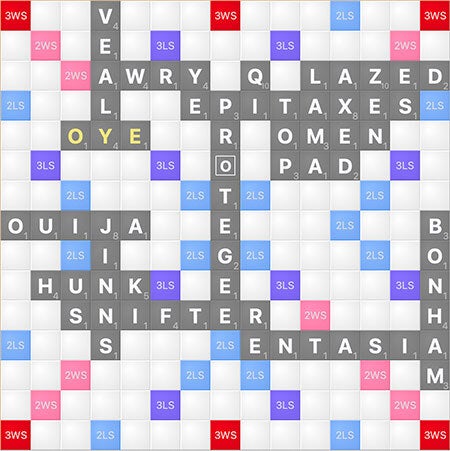
Fatsis: While David is pondering, Harshan arranges two possible bingos: VIDEOfIT# (a computer-generated picture of a person sought by police) at the top for 83 points and TEnIOID# (shaped like a ribbon) near the bottom for 70. “Spotting them both within seconds is incredible recognition on his part,” 2017 North American champ Will Anderson says on the livestream. “That’s amazing.”
Lamabadusuriya: Most experts will pop familiar words into consciousness instantly when they are well studied up. Experiencing this phenomenon with a blank in the mix is a lovely feeling. I knew VIDEOfIT would be devastating compared to TEnIOID from the perspective of board management and the additional points, and was disappointed at seeing WOLVE coming down.
Fatsis: David, your 33-point play gives you a 19-point lead, 375–356. Did you have a feeling you should take out the V spot?
Eldar: No, the V is not threatening, V’s don’t make many words. WOLVE is simply the highest-scoring move. Remember from before—low experts worry about bingo lines. Know where the danger is. It wasn’t the V.
Fatsis: Harshan, you play TEnIOID and surge in front, 426–375. Entering the game’s final stages, were you feeling confident?
Lamabadusuriya: Yes, but my optimism quickly evaporated after David’s next play.
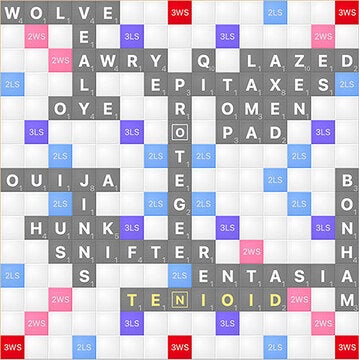
Fatsis: Indeed, what happens next is one of the greatest pressure moves ever in championship Scrabble. David, you’re down 51 points. The tiles are dwindling. Your rack is ACCNOTU. The bingo in there, ACCOUNT, doesn’t fit anywhere. That time you saved early in the game comes in handy now. You have 10 minutes on your clock and spend more than three of them deciding what to do.
On rack cam we see you arrange CATCON#, a catalytic converter, to hook Harshan’s HUNK and score 47 points. Then you place CU to one side for CUD in the upper-right corner for 18. Finally, you set up CUT, to play in that upper right stacked with ever-lengthening words—CUT would turn LAMA into ULAMA, the body of professional theologians in a Muslim country, and AXED into TAXED, for 31.
Those are big differences. After CATCON, you’d trail by just four points. You’d be down 20 after CUT and 35 after CUD. Walk us through your thinking.
Eldar: I was crushed to see TEnIOID. I saw CATCON first but thankfully had enough time to look deeper. CATCON scores the most and leaves two tiles in the bag. OK, not bad. Better than an outright loss anyway. CUD, which I spotted next, in fact opens a bingo line, and turns this into a bingo-and-I-win/don’t-bingo-and-I-lose situation, because I would be too far behind Harshan after CUD to outrun him without a bingo. There are multiple possible draws for me to bingo ending in the C of CUD—NARCOTIC was the most common word—as well as multiple bingo draws along the bottom of the board under TEnIOID.
Fatsis: Quick interjection: David here was figuring out all of the potential bingos based on the tiles remaining on his rack and the tiles unseen to him.
Eldar: Intuition suggested CUD to me. But CUT was even better. To get a bingo, you don’t need to open two bingo lanes, you need one lane that cannot be blocked. If the lane can be spatially blocked, you need to prevent your opponent from blocking it. But Harshan can’t make some piddly blocking play because CHUNK/THUNK/whatever is going to outrun him. CUT makes this situation a nightmare for him. Harshan has to accept now that he is going to lose this game some percentage of the time.
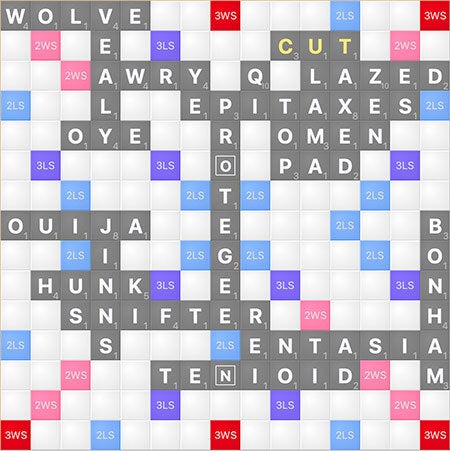
Fatsis: On the livestream, Josh Sokol calls CUT “the most incredible play I’ve seen so far.” The chat goes wild: “omggggg,” “I thought this game was lost for David,” “next level,” “What a turn of events!” “woooooooooow.” In Game 3, David, you made a strategic move that no one anticipated, not the commentators, not the chat, not Harshan, not Quackle: TAN through an A, which out of nowhere created a chance to snatch a win. Now the pivotal move is CUT.
You spend a lifetime memorizing tens of thousands of long, esoteric words and the world championship comes down to a couple of three-letter words you could have spelled when you were four years old.
Eldar: It’s great, because that says to me that the best part of this game, the tactics, can be enjoyed no matter the size of the dictionary, and still be beautiful. I was always interested in the concept of tournaments on a massively constricted dictionary so civilians and word freaks alike can play at a high level without the barrier of word study. There is very little demand for it, though. I hope that changes.
Fatsis: Harshan, after CUT you still lead, 426–406, but you have a lot to consider: what to do with your tiles—AILORUV—and what David might do with the 12 tiles unseen to you, seven on his rack and five left in the bag.
Lamabadusuriya: Once I appreciated the bind David put me in, I was horrified. I can block the CHUNK spot with plays like VIOLA or OVULAR ending beneath TEnIOID. But, based on the unseen tiles, those would allow multiple bingos below them. I didn’t see a way to outscore him. So I played VIOL for 21 points, left one tile in the bag, and hoped for a miracle.
With the benefit of hindsight, I should have applied a sudden-death heuristic: If I play OVULAR and David has a playable bingo, he wins. If he doesn’t, I win. It was scant consolation that had I played OVULAR, David would have bingoed out with GONADIC. CUT was brilliant, and I hope I will one day have a good enough short game to make such a play.
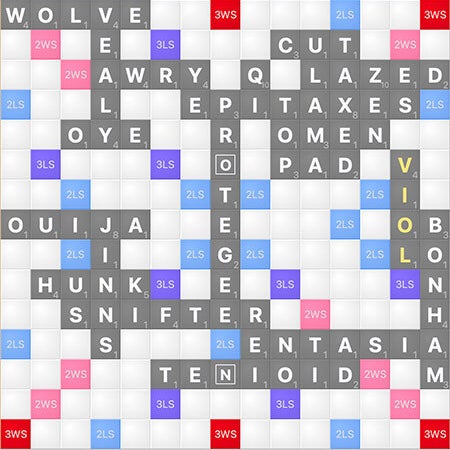
Fatsis: David, you snap-play CODING/CHUNK for 50 and a 9-point lead, 456–447. You still have to draw the final tile in the bag. It’s an R. What are you thinking when you see it?
Eldar: RRRRRRRRRAWR!
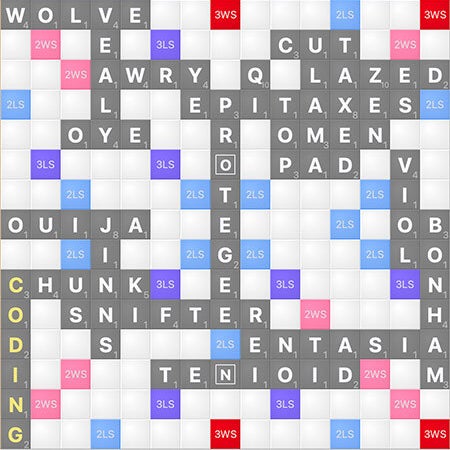
Fatsis: When the bag is empty, Scrabble flips from a game of imperfect information (not knowing what tiles are on your opponent’s rack or in the bag) to one of perfect information (you know exactly what your opponent holds, because you’ve been “tracking” tiles as they are played). Harshan, you play FUBAR for 18 points to retake the lead, 465–456. But as you would say on the livestream afterward, it was merely a fitting word to end with.
Lamabadusuriya: It was obvious that David had multiple unblockable outplays with his remaining tiles of AR, meaning the game was beyond reach.
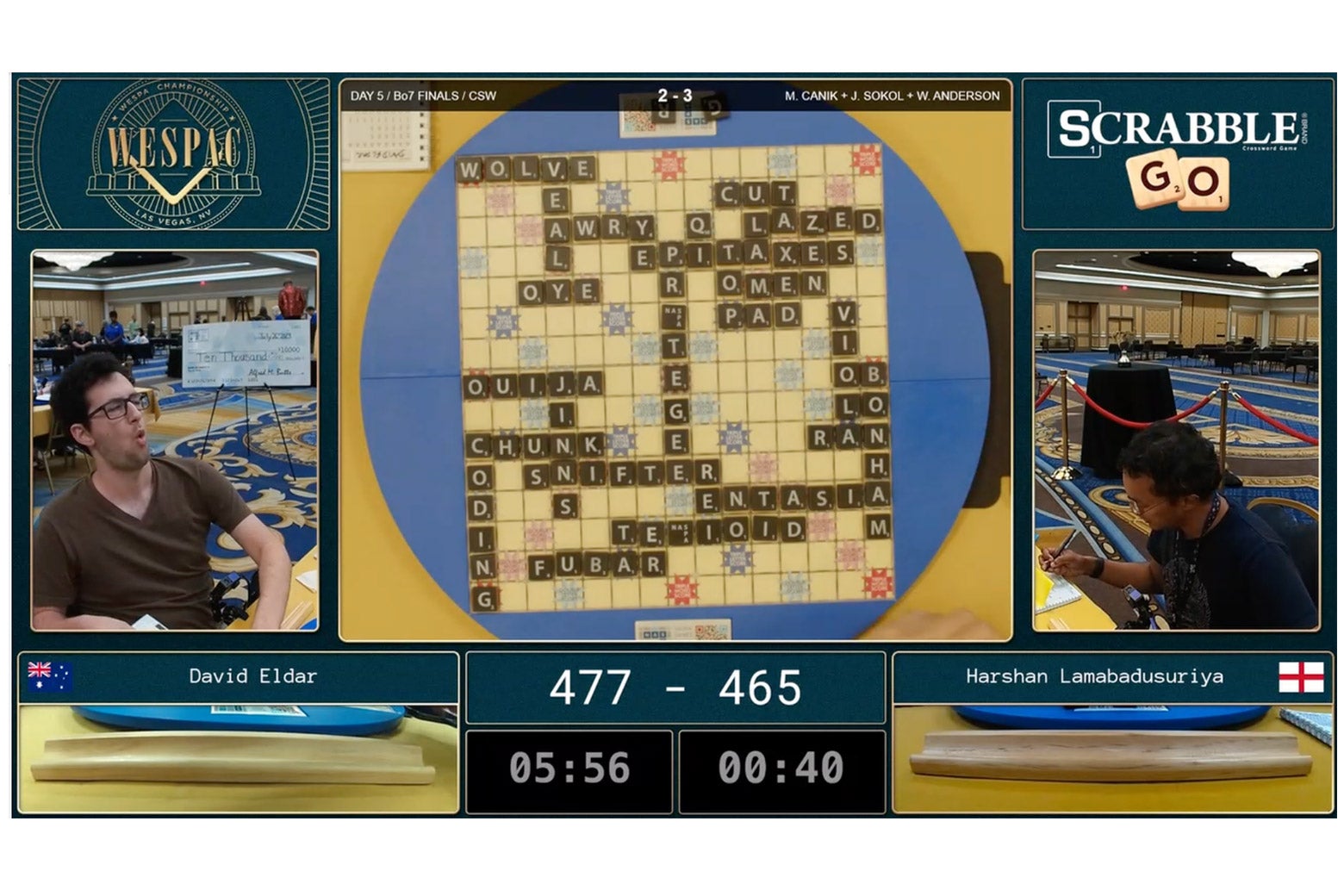
Fatsis: Final score: David 477, Harshan 465. Phew! Game 7 also went down to the wire, with David winning, 480–439. I was exhausted just watching you guys go at it. Fantastic stuff.
Lamabadusuriya: I would like to congratulate David. I especially admire his decision-making, his board vision, his creative setup plays, and his consistently optimal pre-endgame and endgame play. He has shown that learning the words is necessary but not sufficient to survive and thrive at the highest level of Scrabble. He’s a great role model for the rest of us.
Eldar: I think we can all learn from Harshan’s magnanimity and graciousness. Thanks for your comments, Harshan.
Fatsis: David, you also defeated Harshan in the 2017 finals and are now only the second player with more than one world championship. The other is Nigel Richards, who has won six world titles, five North American ones, and, despite not speaking the language, some French ones, too.
Eldar: This is huge for me, of course. But it’s important to remember that I also am just there, like, all the time. I am incredibly fortunate that I have the time and funds to be able to support my hobby as much as I like. That means I can show up to as many world championships as I like. And if you’re as good as me or Harshan, eventually you’re bound to win a few.
Correction, Aug. 10: This article originally misstated the number of Scrabble world titles Nigel Richards has won. He has won six, not three.
